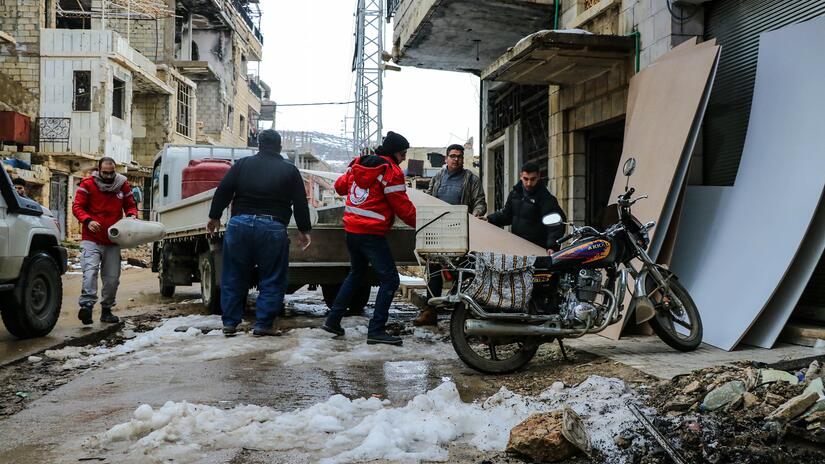Randa El Ozeir: It’s always been about people.
When you see your friend dying before your eyes, no words can be big and expressive enough to capture the intensity of shock and sadness that wraps your whole body and mind. That was exactly what happened with Mohammed Tarek Alashraf, previously a paramedic volunteer in the Syrian Arab Red Crescent Society (SARC) and currently the Disaster Management Unit Coordinator of the SARC Homs Branch. “At the time my colleague and friend, Hakam Duraq El-Sibaye, was martyred, a wave of sorrow engulfed me. We were exchanging a conversation when we received an emergency call. He was in another paramedic team. The SARC was allowed to move around during night time. Hakam’s team took on the task but got shot while doing their job. I was one of the paramedics to aid him and the others. We had to drive them to the hospital where Hakam passed away. It was really hard, and I still remember every detail of our last conversation, his voice and his smile.”
Alashraf and the rest of the volunteers were hesitant and torn between continuing their work or quitting, “Hakam’s parents insisted on us to keep doing our job as would their son have wanted and help the community that needs us,” explained Alashraf, “and so far, we have helped to deliver and oversee the quality and accountability for implementation of relief aids to 129,420 affected families that equal to 594,000 people within Homs Governorate.”
The story of Moaz Al Malki, who started as an SARC emotional supporter in 2012 and became a Water Team Coordinator in Damascus Branch, has a personal trauma twist. He said, “After we finished one of our emergency interventions to add chlorine to sterilize the water coming to Damascus city and add diesel oil to operate the water pumping station, I was kidnapped and detained for five long hours. Thanks to the efforts of some local community groups that were aware of the humanitarian organizations’ role and some competent authorities, I had been released with my companions and our machineries, and we left the area.”
For Donia Mouin AbdAlla, Leader of first-aid team in the SARC, the main hurdle in her doing the job is the emotional state of the patient’s companions. They usually don’t help in making the decision for the patient, which complicates the paramedic task, especially when the crowd gathers around. “Additionally, the scarcity of financial means restricts the options, for example, when the situation requires using an automated ventilator that is available only in private hospitals,” explained AbdAlla. “I don’t exaggerate if I say that my work is a life or death matter for the person who needs rescuing. Being part of this reduces my frustration towards all human catastrophes and crises, particularly in my country. What motivates and excites me is the fact that, despite our limited capacities, we make a huge difference in the lives and the future of families. We see how our noble purpose lessens many distressed families in our beloved country,” said AbdAlla. She is always driven by the idea of “Saving lives” and isolating the patient from any source of harm or damage to stop the bleeding and enhance the recovery with the few equipment she has.
One concrete instance filled AbdAlla with optimism, sweetness, and hope that still linger whenever she has a case to resuscitate. “A child fell from the first floor and was brought to our centre while I was on duty. His heart had stopped beating, and he urgently needed CPR. In less than 15 seconds I started the procedure, and after two full rounds, the child regained his beat following a deep inhale. I didn’t believe it amidst the joking of the paramedic’s team. My hands couldn’t stop doing the CPR and a stupid smile glued on my face and in my heart,” narrated AbdAlla.
As the residents of Old Homs City begun returning to their homes, a beneficiary of the Home Repair and Building Project whose eyes welled up with tears thanked Alashraf saying, “Finally, I am at home today outside the shelter centre and can earn my living with dignity. Hadn’t been for the SARC, I wouldn’t have been able to come back home. The volunteers of the SARC are part of my family.” At this moment, Alashraf was over the moon and realized the tangible impact of the SARC’ humanitarian projects.
The loveliest turn was in Al Malki’s story. He told us that, “in 2015, a special and great lady joined the SARC as a water engineer. This lady is my wife now, and next month we’re going to celebrate the third birthday of our beautiful son.”
After 15 years with the SARC, Alashraf thinks that what kept him doing the same job is the team building, the teamwork spirit, the constant appreciation, the continuing training, improving the leadership skills, and being part of the decision-making. Al Malki said that, “the need in Syria and on the ground is tremendous and exceeds the capacity and power of all the partners and supporters who are trying very hard to help the affected people and the SARC. But my contribution in humanitarian work to better the livelihood of individuals and reserve their dignity gives me the satisfaction without the eternal question ‘what’s in it for me?’”
Article
Statement: IFRC appalled by the killing of another Palestine Red Crescent colleague
Statement: IFRC appalled by the killing of another Palestine Red Crescent colleague
| Article

